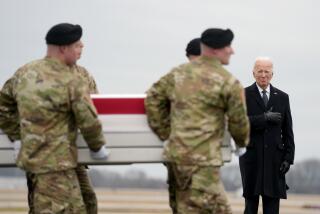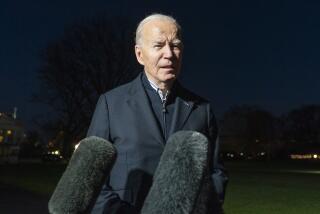Coordinated Suicide Strikes Kill 13 in Iraq
- Share via
KARBALA, Iraq — Insurgents armed with mortars and car bombs launched a multipronged attack Saturday on U.S. allies in this southern holy city, killing 13 people and wounding more than 170, officials said.
The dead were six soldiers from the U.S.-led coalition -- four Bulgarians and two Thais -- as well as six Iraqi police officers and one Iraqi civilian. Scores of Iraqi police officers and five U.S. soldiers were among the wounded, officials said.
It was one of the largest and most brazen assaults by guerrillas fighting the U.S. occupation in weeks. A lull this month has ended with an upsurge in violence by fighters apparently determined to prove that the capture of Saddam Hussein will not deter them.
U.S. Special Forces found Hussein two weeks ago after an intense eight-month manhunt, giving rise to hopes among authorities that the inspirational head of a tenacious anti-U.S. resistance had been lopped off. Although the number of daily attacks may be down by U.S. military count, Saturday’s incursion in relatively peaceful Karbala sounded a roar of defiance.
“This was a coordinated, massive attack planned for a big scale and intended to do much harm,” Maj. Gen. Andrzej Tyszkiewicz, head of the 9,500-member Polish-led multinational force responsible for the Karbala area, told Polish television.
Tyszkiewicz said the attackers, armed with mortars and machine guns, attempted to hit two military bases near the university, a police station and city hall -- all within minutes of one another. Several of the assailants were shot dead, he said.
The five wounded U.S. soldiers are with the Army’s 18th Military Police Brigade and were posted at the Karbala police station. Their injuries were not considered life-threatening. Thirty-two more soldiers from the U.S.-led coalition were wounded.
In separate attacks earlier in the day, insurgents fired rocket-propelled grenades and assault rifles at troops with the U.S. Army’s 101st Airborne Division in the northern city of Mosul. The soldiers returned fire, killing four occupants of a car that they said was the origin of the attack. And near Baghdad, six U.S. soldiers were wounded when two convoys hit roadside bombs.
Karbala is revered by Shiite Muslims and its two major shrines were teeming Saturday with Iranian Shiite pilgrims.
It had been relatively calm since October, when U.S. and Polish troops put down a spasm of violence as rival Shiite Muslim factions, emerging from decades of harsh repression under the Hussein regime, battled for power.
In Saturday’s deadly barrage, witnesses said a truck packed with dynamite barreled across a soccer field toward the university, where Polish and Bulgarian troops are based. Soldiers sprayed it with gunfire, setting off the explosives a short distance from the base.
Seven members of a family living across the street from the Polish military camp were wounded when the blast ripped through their small house, tearing doors from the frames and shattering windows. Five children were among those hurt.
“We were watching the commotion and the Polish troops who climbed on their roof and started shooting,” said Kadila Abbas Hussein, the mother of the wounded children, her own eye blackened and her hands shredded by glass. “Suddenly, everything went black and we were thrown like feathers.”
A few minutes later, another car bomber plowed into the front gate of the city hall compound used by the U.S.-appointed Iraqi mayor of Karbala, killing five police officers stationed there and wounding several people, including the mayor, Akram Yasseri. The building was gutted.
Smoke filled the sky and bloodied victims could be seen staggering from the rubble. Pieces of cars and other debris littered the pavement and streets. Troops sealed roads and wounded soldiers were evacuated by helicopter.
One survivor, a police officer, said he saw four people disguised as police inside the car that exploded.
“I wasn’t even suspicious of the car when I saw it,” Hussein Jassem, 19, said from his hospital bed. Jassem had been on guard duty atop a watchtower in front of city hall. The blast hurled him to the ground.
“They were wearing police fatigues. I didn’t expect it to blow up. There was no shooting. It just drove up with a convoy and blew up.”
The mayor’s driver was also in the convoy. He survived, but two others in his car burned to death.
After initially conflicting reports, the Bulgarian government said four of its soldiers were killed, and a Thai Foreign Ministry spokesman confirmed the deaths of two soldiers in its 422-member force.
The entire 485-member Bulgarian force was being shifted to other bases because its headquarters was destroyed in the attacks, military officials said.
Only a few nations have agreed to send troops to join the U.S.-led mission to pacify and rebuild Iraq, and nearly every contingent has suffered losses. The Italians, based in Nasiriyah, south of Karbala, have taken the greatest hit, with 19 soldiers and paramilitary police officers killed by a suicide bomber in November.
Insurgents also have slain South Korean contractors and Japanese and Spanish diplomats.
The attacks in Karbala came amid a U.S. offensive in Baghdad that includes nightly bombardments of suspected guerrilla positions and the arrest of dozens of Iraqis believed involved in financing, organizing or conducting the resistance.
Besieged in Baghdad, the resistance may have shifted to Karbala, about 70 miles south of the capital, to focus on a softer target. Defenses in Karbala -- manned by Poles, Thais and Bulgarians who insist their mission is primarily humanitarian -- were easier to penetrate.
“Even this blessed city is not safe nowadays,” lamented grocer Karam Khidir, 35.
U.S. Army Brig. Gen. Mark Kimmitt, briefing reporters in Baghdad, said the insurgency is on the decline, the Karbala events notwithstanding. He said attacks had decreased significantly, from about 50 a day in mid-September to an average of 15 a day now, despite what he called a minor spike on Christmas Day of 18 in two hours.
“We’ve always said the capture of Saddam Hussein was a necessary but not sufficient condition to bring safety and security to Iraq,” Kimmitt said. “We never declared that once we had him in prison that we could all go home.
“So while it’s good news, in fact great news, that we have Saddam Hussein in custody right now, there are still significant numbers of former regime elements, some foreign fighters, some international terrorists, present here in the country that haven’t gotten the word.
“We’re going to help bring the word to them.”
Times staff writer Wilkinson reported from Baghdad and special correspondent Al-Rifai from Karbala. Special correspondent Ammar Muhammed also contributed from Karbala.
More to Read
Sign up for Essential California
The most important California stories and recommendations in your inbox every morning.
You may occasionally receive promotional content from the Los Angeles Times.










